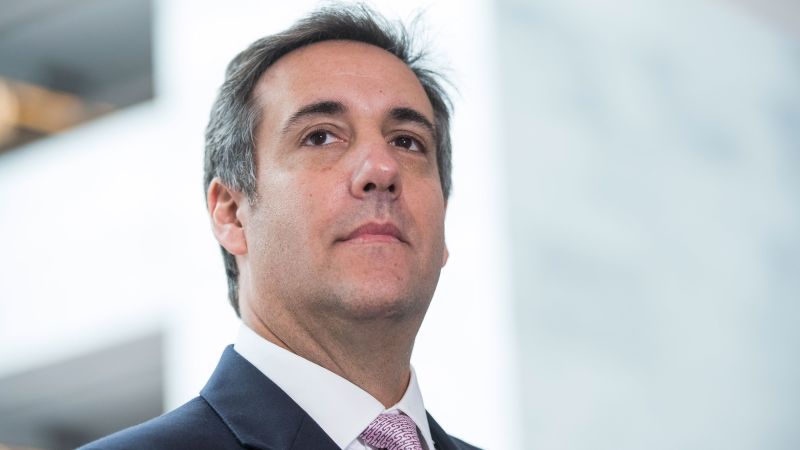Politics
Michael Cohen, once described by Trump as a ‘thug’, to provide crucial testimony in hush money case trial

Former Trump ally and fixer Michael Cohen has taken on a new role as a star witness in a hush money trial that could potentially implicate former President Trump in criminal activities. Cohen, who once served as Trump’s personal lawyer and confidant, will testify about the illegal falsification of business records related to payments made to adult film actress Stormy Daniels in 2016. This trial marks a pivotal moment in the ongoing legal drama surrounding Trump and his alleged involvement in various illicit activities.
Cohen’s relationship with Trump was characterized by loyalty and a willingness to do whatever it took to protect and serve his boss. However, after facing the consequences of his actions, including a prison sentence, Cohen has now turned against Trump and is seeking redemption by exposing the truth about their past dealings. Cohen’s testimony is expected to shed light on Trump’s criminal behavior and his efforts to conceal illegal activities through falsifying business records.
As a key witness in the trial, Cohen’s credibility will be scrutinized by Trump’s legal team, who will likely paint him as an unreliable witness with ulterior motives. Trump’s attorneys will argue that the payments made to Cohen were legal retainer fees and not hush money, as alleged by prosecutors. The trial will be a battle of narratives, with both sides seeking to sway the jury in their favor and cast doubt on the opposing party’s testimony.
Despite his checkered past and history of dishonesty, Cohen’s insider knowledge of Trump’s personal and business dealings makes him a valuable witness for prosecutors. His testimony is expected to corroborate evidence presented by the government, which alleges that Trump falsified financial records to conceal illicit activities. Cohen’s decision to testify against Trump and reveal damning information about their past relationship is seen as a quest for redemption and a warning to the public about the dangers of supporting Trump.
The outcome of the hush money trial could have far-reaching implications for Trump’s political future, as he faces multiple criminal indictments and legal challenges. While the trial itself may not significantly impact Trump’s standing in the eyes of his supporters, a conviction could jeopardize his chances of mounting a successful political comeback. The trial may also serve as a litmus test for Trump’s ability to evade legal consequences and maintain a public image of innocence.
In conclusion, Michael Cohen’s testimony in the hush money trial represents a critical moment in the ongoing legal battle between him and his former boss, Donald Trump. Cohen’s decision to cooperate with prosecutors and reveal damaging information about Trump’s alleged criminal activities underscores the complex and contentious nature of their relationship. As the trial unfolds, the public will be closely watching to see how this high-stakes legal drama plays out and what implications it may have for Trump’s future.

-

 News7 days ago
News7 days agoArsenal Secures Vital Victory Over Man United with 1-0 Win in Premier League: Live Score, Team News, and Updates as Gunners Hold on after Trossard’s Goal
-

 Wellness7 days ago
Wellness7 days agoTop 14 Mineral Sunscreens Recommended by Dermatologists for 2024
-

 Sport6 days ago
Sport6 days agoAGs from conservative states sue the Biden administration to stop ‘extreme transgender ideology’ endangering ‘safety of women and girls’
-

 Food7 days ago
Food7 days ago31 Top Chocolate Gifts to Give This Holiday Season 2022: Featuring Godiva, Ghirardelli, Harry & David, and Williams Sonoma
-

 Food7 days ago
Food7 days ago44 Top Gifts for Coffee Enthusiasts in 2022: Brewing Equipment, Frothers, Grinders, Cups, and Subscriptions
-

 Food7 days ago
Food7 days agoTop 43 Food Gifts for Home Cooks in 2022: Amazon, Great Jones, Williams Sonoma, Food52, Our Place
-

 Sport7 days ago
Sport7 days agoDavid Beckham Sent a Text to Tom Brady After a Harsh Roast on Netflix, Saying ‘It Was Difficult to Watch’
-

 News7 days ago
News7 days agoAmerican soldier’s wife imprisoned in Russia alleges she witnessed his girlfriend from the area stab him while video calling with their six-year-old daughter










